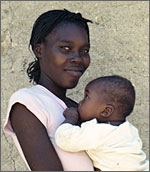 19-year old Merise Merita is a single mother and lives in a poor neighborhood in Port-Salut, Haiti. She is one of thousands of women who benefited from a project that has offered free obstetric care to poor women since 2008.
19-year old Merise Merita is a single mother and lives in a poor neighborhood in Port-Salut, Haiti. She is one of thousands of women who benefited from a project that has offered free obstetric care to poor women since 2008.
Marise says, "This is my first child. I attended two prenatal consultations at the hospital. I did not have problems during pregnancy but I did have complications during the birth and am happy I delivered at the hospital. At home the baby could have died."
In Haiti, too many women are unable to afford maternity care, with fatal consequences for both mothers and children. Even before the devastating earthquake in January 2010, the statistics were alarming: Haiti was a dangerous place to be pregnant. The lifetime risk of dying in childbirth stood at 1 in 44 compared to 1 in 4,300 in most rich countries. Of every 100 children born, more than six failed to survive their first year of life.
Most poor women were forced to give birth at home, assisted by unskilled helpers, as they could not pay for antenatal care and a safe birth at a health facility. Removing the cost seemed an obvious way to increase the use of essential maternal health services.
With the support of the Pan American Health Organization, the Canadian International Development Agency and the European Commission, the Haitian Ministry of Health embarked upon a free obstetric care project which pays health facilities and hospitals to offer poor women free childbirth and care before and after birth, and refunds transport costs.